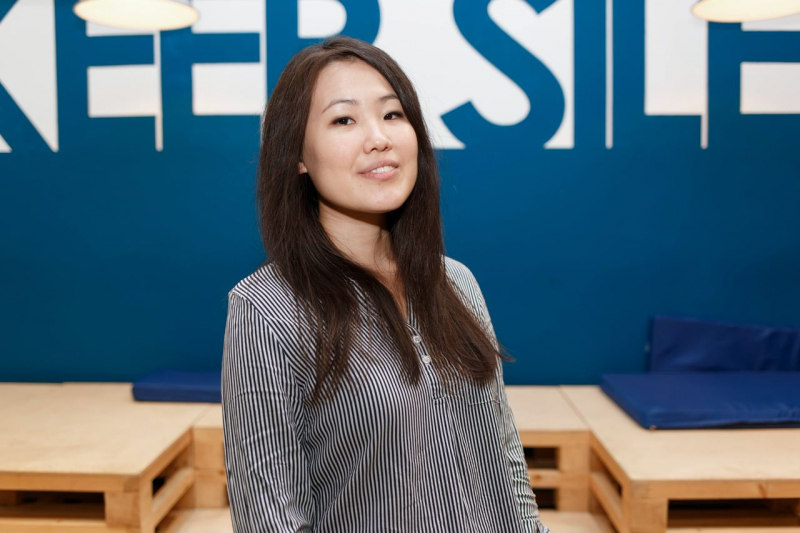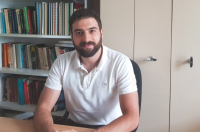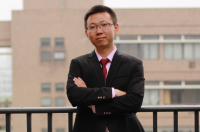Why did you decide to enroll at ITMO University?
In 2014, I got my Bachelor’s in Almaty, Kazakhstan, and faced the question of where to apply for a Master's. At that time, I was working as a web developer and web design was my major interest. I found a Computer Graphics and Web Design program at ITMO, and ITMO was the only university that allowed applicants to submit applications and participate in a portfolio contest online. It was a rather unique opportunity, as other universities demanded in-person entrance examination. I was also attracted by ITMO's history and its status as the winner of numerous programming contests.
Was moving to St.Petersburg a big step for you?
I thought I was 100% ready, but it turned out that I was not. It was my first trip abroad and my life had changed significantly – there were new people and a new environment far away from my family.
When I moved to St. Petersburg, I was surprised by lots of things and especially by Russian mentality, as people seemed closed and less easy-going than in Kazakhstan. Luckily, when you start getting to know the Russians better, the barrier gets removed. The wind blowing from everywhere also came as a surprise. There was nothing like this in Almaty, a city surrounded by mountains. But the air of St. Petersburg is fresh and this is undoubtedly an advantage. In general, it took me a year to adapt and overcome my homesickness before I realized I enjoy being here a lot.
What do you do at ITMO now?
In my second year of studies, Dmitry Shuklin, my supervisor and the head of my department, offered me to try my hand at teaching. Simultaneously I decided to enter PhD studies at ITMO because it’s connected with both pedagogical and research activities. I had to quit my postgraduate studies because of the high workload and because my program was closed.
However, I teach Mobile Application Development at the Faculty of Secondary Vocational Education and the Faculty of Software Engineering and Computer Systems. I also work at the Center for Continuing Professional Education teaching Java Development.
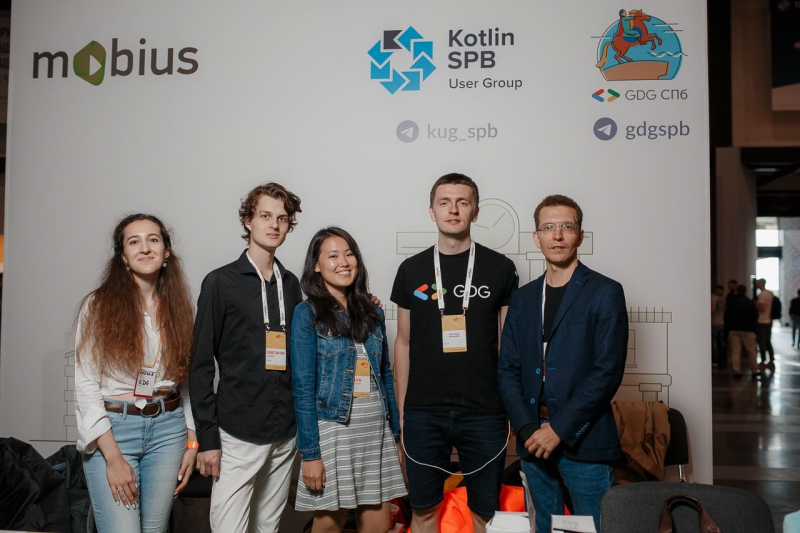
What keeps you interested in mobile app development?
At some point I got bored with building websites and I wanted to try something new. It is worth noting that choice of technologies for developers was poor in comparison to what we have now and I began to study how to build Android applications, which has become my absolute favorite.
There were no object-oriented programming subjects in my curriculum, and I started studying it on my own, choosing Java and then shifting to Kotlin. It was hard, as we didn’t have a well-established environment for it, but soon I got into it and our team even came up with an education app for kids. The secret is that you have to be constantly learning and you will never get bored.
Do you use some special teaching approach?
I teach my students to code in Kotlin. During my lectures, I try to implement more practice-oriented tasks to let students dig deeper in the development process. Since I've been working in this area for four years, I can explain how the architecture of application development has changed: what packages and ways to create fragments there used to be, and so on.
My course covers only Android app development, however, students have a choice whether to write mobile apps for Android or iOS. Some students are interested in cross-platform apps and I support it as well. The only difference is in acquiring materials – some attend lectures, while others study additional materials I share.
If they have any questions, I’m always here to help. Students can always contact me via Telegram, where we have a chat for extracurricular communication. It’s faster and more convenient than using email.
How do you build connections with your students?
I am always curious to learn about my students' plans and career choices. Some of them are already employed in mobile development, which is how I learn new things as well. They are also open-minded. For example, there are 135 students at the Faculty of Secondary Vocational Education who are about 19-20 years old and they are very well-educated for their age. For the most part they are very interested in self-development and I find it amazing.
In the first class we usually play the IT edition of Alias. It includes more than 350 cards with IT terms, which one has to explain to their group mates. Besides, it’s a fun way to establish communication within a group and a chance for me to learn more about people's backgrounds.
In September, when the weather was stunning and there were no project deadlines, we even went to a park to eat pizza and play the game outside. It was a great experience for students and me too.
After ten years of continuously being a student myself, I know I want classes to be exciting, and that’s what I want to give my students – by coming up with new activities and provoking their interest in a subject.
Are educational trends likely to change in the nearest future?
The path and methodology of education are changing rapidly. The main function of a lecturer is to teach how to search for material, process, and analyze it, not merely to give information, claiming that this is an absolute truth.
It is also important to teach students how to study because the role of self-education is increasing. What I realized over time is that students cannot be limited in learning new things within the subject and professors should be more open to new practices.
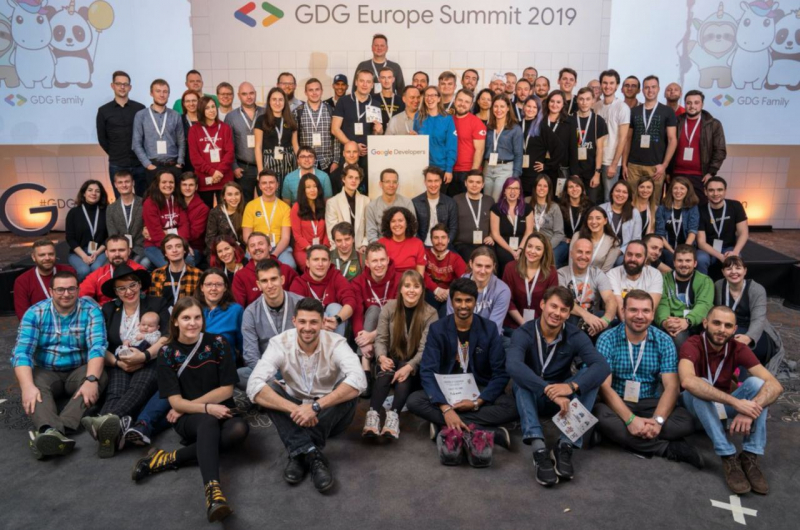
In addition to teaching, what projects are you involved in?
I started making online courses on mobile app development in 2018. I wanted to try to get people acquainted with the basics of mobile development,and let students use these lectures as study material. Currently, there are four courses available at OpenEdu. Another basic online course on mobile development will be released on October 19 and a course on programming in Kotlin will be updated.
My dream is to publish my courses translated into English on Udemy, one of the leading online education platforms available for students from different countries.
Now I also work at JetBrains Academy – I am involved in the development of educational projects in Kotlin and Java.
Several years ago, with the support of Google, my friend Yonatan Levin founded the Android Academy with branches in Tel Aviv, St. Petersburg, Moscow and Minsk. By the second launch I joined a team of lecturers and organizers of the Android Academy in St.Petersburg. We are recruiting students with different backgrounds for free. The studies are practice-oriented – there are lectures, projects, a hackathon as a final task. We are also engaged in creating the Advanced Android Academy – I would really like to participate more but the schedule is too tight.
Do you think it’s important to support women in IT?
In elementary school, I had Peterson's math textbook. All this time I thought it was a man, and only recently I’ve found out that it’s a woman – Ludmila Peterson, DSc, Honorary Worker of Higher Professional Education of the Russian Federation. Of course, you need to support women and I'm glad that this movement is finally gaining ground in Russia.Unfortunately, modern society is still skeptical about women in IT. In 2016, when I went in for an interview, they were biased because I was a foreigner and a woman. Now that I have experience, there are no problems with finding a job but the problem still exists.
By the way, recently my colleague from SPB-TV and I held a workshop on Android development for girls. It lasted a whole day, by the end of which we created a mobile application written in Kotlin. It was very cool and super-intense, and we can’t wait to work on more similar projects.
I am also the ambassador of Women Techmakers and our goal is to help more girls to become a part of the IT field by running meetups. Unfortunately, these projects are currently suspended due to the pandemic.
What are your future plans?
First, I would like to come up with a teaching approach so that students could easily digest and apply information obtained at classes. I’m also thinking of conducting lectures at offices of IT companies. I think it’s a great way to motivate students: they will see how cool the working conditions for IT specialists are and companies can headhunt talented interns.
Over time, I would like to leave teaching and get involved in practice-oriented Android development in a company, devoting more time to Android Academy and supporting Women Techmakers.
In the near future, I plan to attend more international conferences and get to Google I/O, which went online this year due to the pandemic. It’s a venue for networking opportunities and education.
Check out more international stories and also follow us on Facebook and Instagram.
